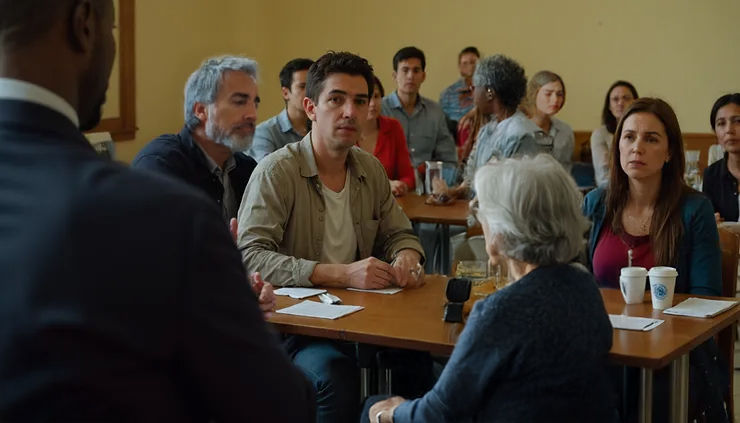Dealing With the Fallout of the 2024 U.S. Election
- Jo
- 22 hours ago
- 4 min read
It's hard to believe it's been four months since the results of the November 2024 U.S. election. For many Americans, the aftermath feels overwhelming. In our small communities of Pope and Yell Counties in Arkansas, we are grappling with confusion and disbelief. How could so many of our neighbors support a controversial figure, a person who had faced serious convictions just a year prior? This reality has sparked deep feelings of anger and distrust among us.
Recently, I attended a gathering organized by a new community group dedicated to bringing together people who share similar concerns. The goal was clear: to find ways to navigate through the political mess of the 2024 U.S. Election that lingers around us. I recognized familiar faces in the crowd, each derived from similar sentiments of sorrow and confusion. This meeting was uplifting but didn't provide any immediate solutions. I was seeking something that would inspire, energize, and guide us on how to move toward a better outcome in 2026 and beyond. I know, I know... give it time.
The Emotional Impact of the 2024 U.S. Election Results
During our gathering, it was clear that the election left many feeling defeated. Sadness was evident on the faces of friends and neighbors. This wasn't just a political setback; it felt like a blow to our core values. It's distressing to think that people we once saw as allies would support someone with such a troubling history. Findings from a 2023 Pew Research Center study showed that nearly 63% of Americans felt that the political divide had grown more pronounced, and this election only intensified those feelings.
The anger and distrust many of us feel have profound effects on our daily lives. It’s tough to understand how voters could back a convicted felon. This situation isn't just an abstract discussion; it alters how we view our neighbors, our friends, and even ourselves. The emotional fallout of this election will take time to process.
A New Approach to Community
At our meeting, several speakers shared their thoughts on our collective despair but emphasized the importance of unity. We found some comfort in openly discussing our feelings, and this outlet felt transformative. In a time filled with anger, sadness, and fear for the future, creating a supportive community can act as a balm for our wounds.
We expressed our frustrations, questioning how such a sizeable part of the electorate could support a candidate whose actions resonate with our worst fears. Yet, while acknowledging our anger is essential, we know we must channel it into proactive measures. For example, we could start local initiatives that engage our communities in meaningful dialogue, aiming for understanding instead of division.

Finding Common Ground
Leaving the meeting, I felt an incomplete sense of purpose, tinged with the weight of our shared sadness. Hopefully, our community group will stand as a lifeline for those of us wrestling with the election's impact. We don't just want to lament; we want to create a strategy for moving forward. As a collective, we may not control national politics, but we can cultivate change in our local environments.
It’s essential to remember that we can unite in our shared values. While the national stage seems chaotic, there is hope in our local actions. For instance, initiatives like town halls or community service days could become avenues for connection and healing. The idea is to build bridges rather than walls within our neighborhood.
Navigating the Day-to-Day Realities
Processing our feelings about the election and its fallout can feel like a mountain to climb. The constant stream of political news can overwhelm anyone. Every decision from Washington seems designed to divide, leaving many of us feeling even more alienated. Findings are from the 2024 Stress in America survey revealed that 69% of adults identified the U.S. presidential election as a significant source of stress, reflecting widespread disillusionment with the political process. This sentiment underscores the growing frustration many Americans feel toward the state of politics.
While community discussions are small steps, they are vital in addressing the emotional implications of this election. Many are now facing the repercussions of their voting decisions. As we engage in these conversations, we must consider how to counteract destructive support for the current administration. It's crucial to speak up and connect with those who may feel lost in their beliefs.
The Road Ahead
The next four years in American politics are likely to be challenging and unpredictable. It's easy to retreat into despair, but engagement with our communities is essential. We must find a path forward, one that connects us and strengthens our resolve.
By prioritizing group meetings and discussions, we foster an environment of support for one another. Though I entered that meeting feeling defeated, I left with a tingling of hope in my heart. We realized we are not alone.
As we navigate this uncertain political landscape, we have a significant task ahead. We need to define our values, challenge divisive narratives, and brainstorm solutions that benefit everyone in our communities. While change often takes time, there’s hope in collective action.
Keeping the Faith
Despite the clouds looming over us, I choose to believe in my community's strength. Our political landscape may seem grim, but the resilience in our conversations inspires hope. We have the opportunity to address our anger, sadness, and fear as a collective force, forging a better path ahead.
Over the coming months and years, we must stay committed to supporting one another and work towards a shared vision for our communities. Change is usually slow, but with a united front, we can make a difference.
As we commit to our monthly meetings and keep the conversations going, together, we can transform our frustrations into meaningful actions, creating a ripple effect of change that not only confronts the current political climate but uplifts everyone in the process.
Comentarios